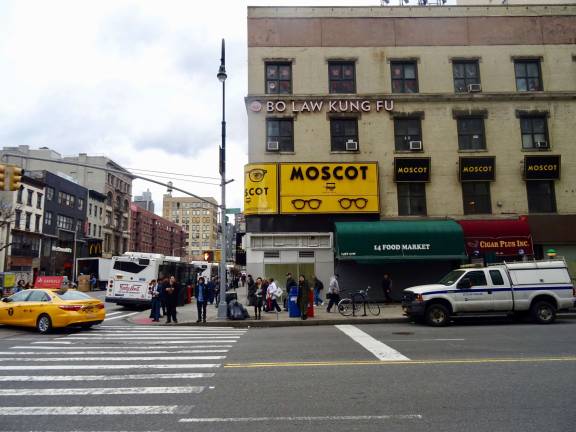the last dance

BY CLARRIE FEINSTEIN
On January 31, PMT Dance Studio, housed in a historic building on the northeast corner of 14th Street and Sixth Avenue, closed its doors for a final time. The building was sold to Extell Development and will most likely be demolished in the coming year.
The building was home to various dance studios over the last several decades, including, it's said, Merce Cunningham and Martha Graham. Its last was PMT, an acronym for its founder, Pavan M. Thimmaiah, who opened his studio in 2001. While Thimmaiah is hoping to move his studio to a space at 25th and Sixth Avenue, the closure and, ultimately, the wrecking of the 14th Street building is distressing to many who have spent time at the studio or in other venues at the building.
“People are mourning the closing of this building,” Thimmaiah said last week. “Some people have been coming here since the 1960s and have seen all the incarnations the space has gone through. I've just been consoling people. People came to the studio crying.”
The studio's shuttering was first reported on the blog Jeremiah's Vanishing New York.
Thimmaiah recalls a couple who met at the studio — she was the teacher, he was the student — who would later marry. “These are the stories that I love,” he said. “Just to see how this space changed people's lives. For some, dance gave them a purpose, or they met their partners here, or they just found they belonged in this community. We've cultivated the arts here in an original way. B-boys, dance crews.... Anyone can come in here and use the space to create.”
PMT seeks to foster community, a place where artists can support their peers, which follows in the tradition of the building's history, Thimmaiah said. After the Stonewall riots in 1969, the newly formed Gay Liberation Front (GLF) used the space as a political activist outpost. It was home to Alternate U. – a free counterculture school and leftist organizing center. There were several classrooms on the second floor of the building.
Meetings were also held there in the aftermath of the Snake Pit bar raid in 1970. But one of the most popular events for the GLF were the weekly dances, which provided a rare opportunity for LGBTQ people to dance together in public.
Now the building, and three more to the north of it, are empty with just a Sol Moscot sign on display on the first floor of 69 West 14th. Nine storefronts there are shuttered. Thimmaiah cited forbidding rent increases for smaller businesses such as PMT, which are at a significant disadvantage when competing against tech giants such as Google, Amazon and others. Businesses are asked to bid between six to seven-digit figures just to have a seat at the negotiations table. That's why Thimmaiah started a GoFundMe campaign to support PMT's new incarnation, which he said would become a nonprofit in the coming months.
“The scene in the city has really changed,” he said. “It's become so outpriced here for artists and that doesn't allow for individuality to be cultivated. The talent is going to other cities. When you don't have affordable venues, we can't offer artists the space to create. That's a real problem.”
The sentiment is shared by Neil Greenberg, a professor of choreography at the New School's Eugene Lang College of Liberal Arts, who remembers when he rented studios for three dollars per hour in the 1980s, whereas now, even a moderately priced studio goes for at least $25 an hour. “It's much more difficult for artists to do the work they want to do,” said Greenberg, who has been in New York since 1976. “It's unaffordable.”
Greenberg is pleased PMT is relocating — it's a rare occurrence for a dance studio to be able to achieve in Manhattan. Thimmaiah is hoping to move into his new dance studio in March or April.